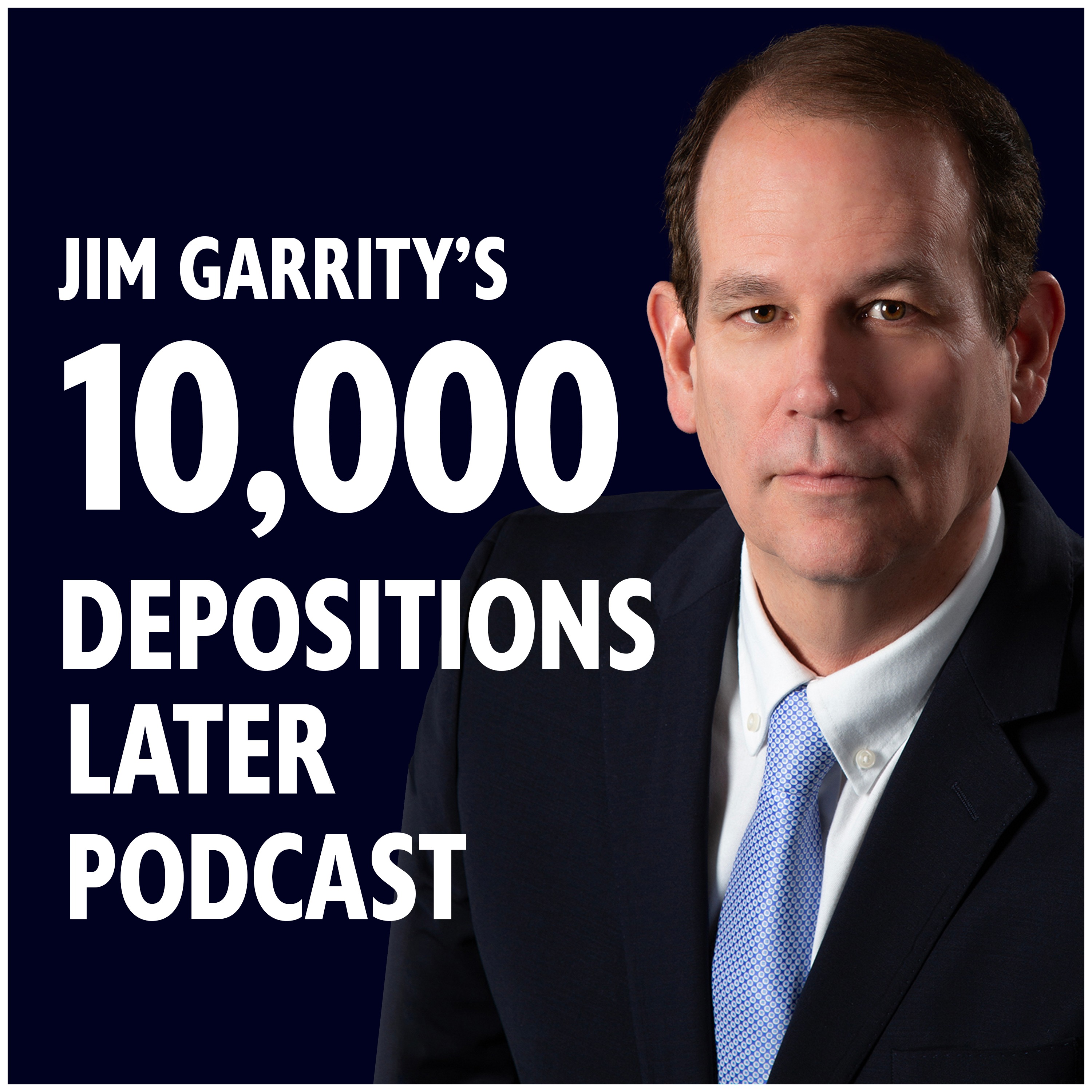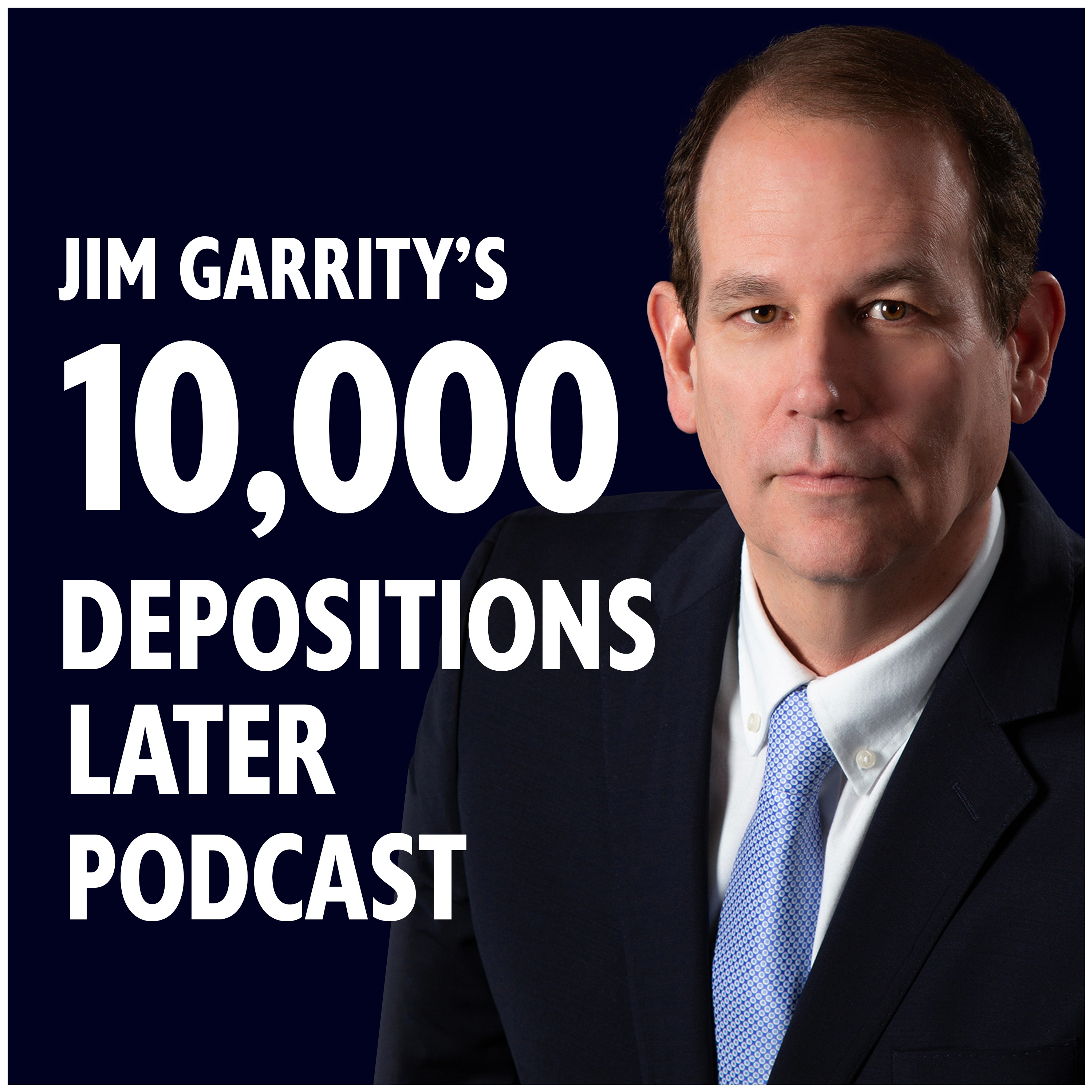

10,000 Depositions Later Podcast
https://feeds.redcircle.com/2a735a63-230f-4d06-a67d-3f68dde99393Episode List

Episode 162 - Your Mute Button is Career Insurance
In this episode, Jim Garrity uses a pending bar disciplinary proceeding against a Florida lawyer as a potent reminder of the consequences of failing to ensure that your conversations during breaks in remote (virtual) depositions are not heard by others. As always, he offers practical guidance to help you avoid this potentially career-ending mistake. Citations to the referenced case are in the show notes.SHOW NOTESZoom community forum reporting audio feed despite activation of mute button (https://community.zoom.com/t5/Zoom-Meetings/Participant-on-mute-yet-I-can-still-hear-them/m-p/142674)Excerpt from Zoom’s terms of service at https://www.zoom.com/en/trust/terms/ (You agree [that the software and services are provided “as is” and that Zoom makes no guarantee] . . . .that the services or software will...be...error free. . . . [Y]ou will be solely responsible for any damage to you resulting from the use of the services or software. The entire risk arising out of use or performance of the services or software remains with you”)Complaint, The Florida Bar v. Ferro, Case No. SC-2024-0156 (Fla. Sup. Ct. filed February 1, 2024); Florida Bar File Nos. Case Nos. 2023 – 30,035 (09B), 2023–30,115 (09B), and 2023-30,187(09B)Respondent’s Response to Complaint, The Florida Bar v. Ferro, Case No. SC-2024-0156 (Fla. Sup. Ct. filed March 11, 2024); Florida Bar File Nos. Case Nos. 2023 – 30,035 (09B), 2023–30,115 (09B), and 2023-30,187(09B)Report of Referee, The Florida Bar v. Ferro, Case No. SC-2024-0156 (Fla. Sup. Ct. filed April 28, 2025); Florida Bar File Nos. Case Nos. 2023 – 30,035 (09B), 2023–30,115 (09B), and 2023-30,187(09B)Amended Initial Brief (attorney appealing Report & Recommendation of Referee), The Florida Bar v. Ferro, Case No. SC-2024-0156 (Fla. Sup. Ct. filed September 15); Florida Bar File Nos. Case Nos. 2023 – 30,035 (09B), 2023–30,115 (09B), and 2023-30,187(09B)

Episode 161: Unfinished Testimony - Can You Use That Partial Transcript?
Today, Jim Garrity examines a critical issue in trial practice: whether an incomplete deposition—cut short when the deponent becomes unavailable—can be admitted at trial, particularly when the opposing party had no opportunity for cross-examination. Drawing on a new Sixth Circuit Court of Appeals decision and Rule 32 of the Federal Rules of Civil Procedure, Jim explores the court’s decision, the key factors trial lawyers should argue for or against exclusion, and the balancing test that should be used when essential testimony hangs in the balance. Discover practical strategies for both offering and opposing use of incomplete deposition transcripts in high-stakes litigation. Thanks for listening!SHOW NOTESInsight Terminal Solutions, LLC v. Cecelia Financial Management, et al., No. 24-5222, 2025 WL 2434894 (6th Cir. August 25, 2025) (reversing trial court’s ruling that deposition was categorically inadmissible because defendants did not have an opportunity to cross-examine a 30 B6 deponent before his death)Fed.R.Civ.P. 32(a) (setting three-part test for admissibility of deposition testimony at trial)Treharne v. Callahan, 426 F.2d 58 (3d Cir. 1970) (court upheld the district court's discretionary admission of written interrogatory answers given by the now-deceased defendant, even though the plaintiff could not cross-examine; under Federal Rules of Civil Procedure 26 and 33, answers to interrogatories can be used to the same extent as depositions, which are admissible if the witness is dead; further, the need for the evidence—being the only defense evidence—outweighed the lack of cross-examination, especially where death was not caused by the party offering the evidence and there was no fault involved)Duttle v. Bandler & Kass, 127 F.R.D. 46 (S.D.N.Y. 1989) (magistrate declined to exclude a deposition taken without defense counsel present, even though the witness died before cross-examination could occur; under Rule 32(a), depositions of deceased witnesses may be admitted if the party had notice and opportunity to participate, and the prejudice to the party proffering the deposition (who would lose critical evidence) outweighed potential prejudice to the opponent. Court proposed that any prejudice could be minimized by stipulating to facts the defense might have developed via cross-examination, reducing the impact of any lost impeachment opportunity)Derewecki v. Pennsylvania R. Co., 353 F.2d 436 (3d Cir. 1965) (trial and appeals courts admitted decedent’s incomplete depositions as evidence, despite the absence of cross-examination by the defendant who had no chance to cross-examine before the witness died; Rule 26 authorized admission of depositions when the deponent is deceased as long as the circumstances justified it, and both parties had agreed the deposition was “completed” for evidentiary purposes; further, the harm in excluding the sole direct evidence of how the accident occurred outweighed the right to cross-examination. Courts must consider whether the lack of cross is due to fault; here, no such fault was shown)Waterman S. S. Corp. v. Gay Cottons, 414 F.2d 724 (9th Cir. 1969) (deposition of a witness who died before any cross-examination by the adverse party was admitted in bench trial; where there was no realistic possibility that cross-examination would have materially aided the party, exclusion was not required. Further, deposition testimony corroborated by other evidence; thus, lack of cross-examination did not affect the outcome)In re Reingold, 157 F.3d 904 (5th Cir. 1998) (testimony excluded at trial level; exclusion reversed. Trial court excluded party-plaintiff’s perpetuation deposition, taken while the plaintiff was gravely ill and ended before cross-examination could be completed due to the witness's declining condition and ultimate death; Fifth Circuit held this exclusion to be a clear abuse of discretion and granted mandamus relief directing admission of the video deposition; FRCP 32(a) creates strong presumption favoring admission of a deceased witness’s deposition. Exclusion is only justified by a specific and particularized showing of prejudice, such as stating what crucial areas would have been dealt with in cross-examination; a mere generalized complaint about the lack of cross is insufficient. Since the opposing party had already conducted a substantial deposition of the witness in prior proceedings, the risks of prejudice were further minimized)

Episode 160 - Depo Case Roundup for the Week of August 25, 2025
This week’s roundup spotlights four brand-new deposition rulings from across the country. Two address when plaintiffs may appear remotely—what courts require, what constitutes good cause, and the practical showings that move the needle. The other two confront a quiet but consequential trial hazard: deposition testimony that’s read or played for the jury yet never placed into the record. (Many reporters pause their keyboards during read-ins, assuming the material is already transcribed—an easy oversight that can derail an appeal if the missing testimony is essential.) Join us for a concise tour of the standards, the pitfalls, and the simple steps to protect your record before it’s too late. It's another critical episode from the country's leading expert on depositions. Citations and parentheticals to every case discussed appear in our show notes. Have a great week!SHOW NOTES**Added after episode aired**White v. Lozano, No. 13-24-00336-CV, 2025 WL 1788040, at *9 (Tex. App. June 30, 2025) (court reporter failed to transcribe the depositions or include the video recordings in the appellate record. This was error, but, because White's counsel did not object to the reporter's failure, he cannot now complain of it on appeal)**Original Case List**Insight Terminal Solutions, LLC v. Cecelia Financial Management, et al., No. 24-5222, 2025 WL 2434894 (6th Cir. August 25, 2025) (reversing trial court’s ruling that deposition was categorically inadmissible because defendants did not have an opportunity to cross-examine a 30 B6 deponent before his death)Fed.R.Civ.P. 32(a) (setting three-part test for admissibility of deposition testimony at trial)Treharne v. Callahan, 426 F.2d 58 (3d Cir. 1970) (court upheld the district court's discretionary admission of written interrogatory answers given by the now-deceased defendant, even though the plaintiff could not cross-examine; under Federal Rules of Civil Procedure 26 and 33, answers to interrogatories can be used to the same extent as depositions, which are admissible if the witness is dead; further, the need for the evidence—being the only defense evidence—outweighed the lack of cross-examination, especially where death was not caused by the party offering the evidence and there was no fault involved)Duttle v. Bandler & Kass, 127 F.R.D. 46 (S.D.N.Y. 1989) (magistrate declined to exclude a deposition taken without defense counsel present, even though the witness died before cross-examination could occur; under Rule 32(a), depositions of deceased witnesses may be admitted if the party had notice and opportunity to participate, and the prejudice to the party proffering the deposition (who would lose critical evidence) outweighed potential prejudice to the opponent. Court proposed that any prejudice could be minimized by stipulating to facts the defense might have developed via cross-examination, reducing the impact of any lost impeachment opportunity)Derewecki v. Pennsylvania R. Co., 353 F.2d 436 (3d Cir. 1965) (trial and appeals courts admitted decedent’s incomplete depositions as evidence, despite the absence of cross-examination by the defendant who had no chance to cross-examine before the witness died; Rule 26 authorized admission of depositions when the deponent is deceased as long as the circumstances justified it, and both parties had agreed the deposition was “completed” for evidentiary purposes; further, the harm in excluding the sole direct evidence of how the accident occurred outweighed the right to cross-examination. Courts must consider whether the lack of cross is due to fault; here, no such fault was shown)Waterman S. S. Corp. v. Gay Cottons, 414 F.2d 724 (9th Cir. 1969) (deposition of a witness who died before any cross-examination by the adverse party was admitted in bench trial; where there was no realistic possibility that cross-examination would have materially aided the party, exclusion was not required. Further, deposition testimony corroborated by other evidence; thus, lack of cross-examination did not affect the outcome)In re Reingold, 157 F.3d 904 (5th Cir. 1998) (testimony excluded at trial level; exclusion reversed. Trial court excluded party-plaintiff’s perpetuation deposition, taken while the plaintiff was gravely ill and ended before cross-examination could be completed due to the witness's declining condition and ultimate death; Fifth Circuit held this exclusion to be a clear abuse of discretion and granted mandamus relief directing admission of the video deposition; FRCP 32(a) creates strong presumption favoring admission of a deceased witness’s deposition. Exclusion is only justified by a specific and particularized showing of prejudice, such as stating what crucial areas would have been dealt with in cross-examination; a mere generalized complaint about the lack of cross is insufficient. Since the opposing party had already conducted a substantial deposition of the witness in prior proceedings, the risks of prejudice were further minimized)North Carolina v. Johnson, No. COA24-451, 2025 WL 2408913 (N.C. Ct. App. Aug. 20, 2025) (court could not consider arguments in favor of reversal that were based on videotaped testimony played at trial but not placed into the trial record)G.W. Aru LLC, et al. v. W.R. Grace & Co. No. CV JKB-22-2636, 2025 WL 2402194 (D. Md. Aug. 19, 2025) (court ordered parties to transcript deposition excerpts played at trial, and then file those excerpts by stipulation, where they had not been entered into the docket)Shumaker v. Alarsi, et al., No. 1:23-CV-4-SA-DAS, 2025 WL 2418386 (N.D. Miss. Aug. 20, 2025) (rejecting motion for protective order, to allow plaintiffs to avoid 900-mile trip for in-person deposition, where the motion lacked any meaningful detail showing good cause for such an order)Shah v. Fortive Corporation, et al., Case No. 1:22-cv-312 (S.D. Ohio Aug. 21, 2025) (rejecting plaintiff's request to appear remotely where travel to the forum of the litigation would require "40,000 miles of flight over 48 hours"; plaintiff failed to show distinct hardship or expense)

Episode 159 - Lessons from the Front Lines: Budget-Friendly Depositions: Using a Videographer to Tape & Transcribe Depositions
Are deposition expenses busting your budget? In this episode, Jim Garrity spotlights a clever strategy conceived by a southern California litigator to sharply cut the costs of deposition transcripts. It's yet another effort by trial lawyers to combat the insane costs of stenographic reporting, and one worth trying. The show notes point to seventeen relevant filings on this issue, four federal rules, and a website for a service that is actively helping lawyers cut deposition costs.Like this podcast? Our production crew LOVES 5-star reviews. They're free, fast to leave, and provide us the kind of appreciative good vibes we crave. Would you mind taking ten seconds and clicking on the five-star rating? Thanks!SHOW NOTES:Note: All filings listed below are from the case Black v. City of San Diego, Case No. 21-cv-1990-RBM-JLB (S.D. Cal. Mar. 27, 2025)Plaintiff’s Application For Leave To Conduct Deposition By Video And To Prepare Transcript Using Voice Recognition Technology According To FRCP Rule 30(b)(3)(A) (initial application by Plaintiff) PACER Doc. 153Defendants’ Opposition To Plaintiffs Application For Leave To Prepare Deposition Transcript Using Voice Recognition Technology, PACER Doc. 160.Declaration Of Casey Stark In Support Of Plaintiffs Motion For Leave To Conduct Deposition By Video And To Prepare Transcript Using Voice Recognition Technology According To FRCP 30(b)(3)(A), PACER DOC. 153-1Defendant Tutterow’s Notice Of Joinder In Defendant City Of San Diego’s Opposition To Plaintiffs Ex Parte Application For Leave To Conduct Deposition By Video And Prepare Transcript Using Voice Recognition, PACER Doc. 162.Defendants Supplement To Opposition To Plaintiffs Application For Leave To Prepare Deposition Transcript Using Voice Recognition Technology, PACER Doc. 164Plaintiffs Reply To Opposition To Application For Leave To Conduct Deposition By Video And To Prepare Transcript Using Voice Recognition Technology According To FRCP Rule 30(b)(3)(A), PACER Doc. 165Second Supplemental Declaration Of Casey Stark In Support Of Plaintiff Motion For Leave To Conduct Deposition. Etc., PACER Doc. 170Defendants Second Supplement To Opposition To Plaintiffs Application For Leave To Prepare Deposition Transcript Using Voice Recognition Technology, PACER Doc. 171Order (Magistrate Judge) Denying Plaintiff’s Application For Leave To Conduct Deposition By Video And To Prepare Transcript Using Voice Recognition Technology, PACER Doc. 172Plaintiff’s Notice Of Objection To Order Denying Application For Leave To Conduct Deposition, Etc. PACER Doc. 173 (appealing magistrate judge’s order to district judge)Defendant’s Response To Plaintiff’s Objection To Magistrate’s Order Denying Claims Application For Leave, PACER Doc. 174Plaintiffs Opposition To Defendants Response To Player’s Objection To Magistrate’s Order Denying Plaintiff’s Application, Etc., PACER Doc. 175Order (District Judge) Overruling Plaintiff’s Objections, PACER Doc. 178Order Granting Joint Motion For Protective Order, PACER Doc. 32 (providing that certain information was to remain confidential)Modified Protective Order, PACER Doc. 156Readback.legal (reporting agency dedicated to reducing deposition -related costs; interview of Readback’s Chief Legal Officer in podcast episode 87)1993 Committee Note to Fed. R. Civ. P. 26 (noting that where a deposition isn't stenographically recorded, transcripts are often later prepared by counsels' own law firmsFed. R. Civ. P. 30(b)(3)(a) (allowing lawyers to capture deposition testimony by stenographic means only, audio only, video only, or any combination of the three)FRCP 26(a)(3)(A)(ii) and FRCP 32(c) (providing that if counsel chooses to record a deposition by video only and plan to present it at trial or hearing, they must provide a transcript of the testimony to the other parties and the court)Readback.legal (innovative and budget-friendly service advertised as "certified, court-admissible deposition service built for legal professionals who need clarity, speed, and accuracy, without relying on outdated stenography")

Episode 158 - Using Videotaped Deposition Clips in Openings and Closings
In this episode, Jim Garrity argues for more frequent videotaping of depositions, especially those of parties and witnesses likely to be unavailable at trial. The reason? Unlike live witnesses - who are generally called once in trial - videotaped testimony can be played two or more times. This technique utilizes one of the most effective tools of persuasion ever invented, repetition, borrowed straight from Madison Avenue, where repetition is everything. Clips played during the trial, during closing, and sometimes in opening by consent or court order, allow you to essentially present the same witness and testimony multiple times. This kind of repetition isn't possible with live witnesses, and is far superior to reading deposition transcripts to the jury. In a world where people are accustomed to getting their information through video, reading a transcript of testimony is likely to test your jurors' attention span (and patience). Garrity discusses a UCLA professor's "7-38-55 rule" to underscore the point. The gist of this rule is that when people communicate, only 7% of the message is conveyed through words, 38% through tone and voice, and a whopping 55% through body language. That's what makes the presentation of deposition testimony by video clips so powerful. Listen in!SHOW NOTESSmith, et al. v. City of Chicago, etc., Case No. 21-cv-1159, 2025 WL 1744919 (N. D. Ill. June 24, 2025) (denying use of video depo testimony in opening, but allowing it in closing argument that was admitted into evidence during trial, over objections by defendants that permitting video testimony during closing statements would be “unfairly prejudicial because it emphasizes testimony that is presented by video through repetition, and that opportunity does not exist for a live witness”)Hynix Semiconductor Inc. v. Rambus Inc., No. C-05-00334 RMW, 2008 WL 190990, at *1 (N.D. Cal. Jan. 21, 2008) (denying use of video depo testimony in opening, but would consider allowing reading from transcript; “If the parties wish to read a portion of a deposition transcript in their opening statement, they are to exchange any excerpt with opposing counsel sufficiently in advance of opening statements so that the court can rule on any dispute over use”)Doe v. City of San Diego, No. 12CV689-MMA (DHB), 2014 WL 11997809, at *6 (S.D. Cal. July 25, 2014) (collecting cases refusing to allow playing of videotaped deposition testimony during opening statements) (“See In re Ethicon, Inc., 2014 WL 505234, at *8 (S.D. W. Va. Feb. 5, 2014) (“[T]he use of video clips during opening statements is precluded as to all parties ....”) (quoting In re Bard, Inc., 2013 WL 3282926, at *8 (S.D. W. Va. June 27, 2013)); Carpenter v. Forest Meadows Owners Ass'n, 2011 WL 3207778, at *7 (“Video recordings of the deposition will not be permitted.”) (emphasis in original); Chopourian v. Catholic Healthcare W., No. 09–2972 KJM, 2011 WL 6396500, at *7 (E.D. Cal. Dec. 20, 2011) (denying the plaintiff's motion to use portions of videotaped depositions during opening statement); Hynix Semiconductor Inc. v. Rambus, Inc., 2008 WL 190990, at *1 (N.D. Cal. 2008) (“Neither side shall use any videotaped deposition testimony in its opening statement.”); but see Sadler v. Advanced Bionics, LLC, at *3 (W.D. Kent. April 1, 2013) (providing that the court “may” consider allowing the parties to utilize videotaped deposition testimony during opening statements); MBI Acquisition Partners, L.P. v. Chronicle Pub. Co., 2002 WL 32349903, at *2 (permitting party to play segments of video deposition in its opening statement))Beem v. Providence Health & Servs., No. 10-CV-0037-TOR, 2012 WL 13018728, at *2 (E.D. Wash. Apr. 19, 2012) (rejecting request to play videotaped deposition during opening, and rejecting argument by plaintiff that, under Fed. R. Civ. P. 32(a)(3), she may use the deposition of an adverse party “for any purpose,” stating that “What Plaintiff proposes to do, is to introduce evidence during opening statement. The Court will not allow the showing of video deposition excerpts during opening statement. The motion is denied.”)K.C. ex rel. Calaway v. Schucker, No. 02-2715-STA-CGC, 2013 WL 5972192, at *7 (W.D. Tenn. Nov. 8, 2013) (“there is no per se ban on the use of video excerpts of depositions in closing arguments”; also citing 88 C.J.S. Trial § 300 (2013) (“[T]here is no blanket prohibition against counsel playing selected portions of a videotaped deposition for a jury during closing argument, and trial courts have discretion to permit, or to refuse, the replaying of videotape segments in closing argument.”)MBI Acquisition Partners, L.P. v. Chron. Pub. Co., No. 01-C-0177-C, 2002 WL 32349903, at *1 (W.D. Wis. Oct. 2, 2002) (allowing use of video depo excerpt in opening, stating, without further discussion, that “Defendants may use excerpts from the video deposition of David Straden during opening argument. Counsel are to advise plaintiff's counsel promptly of the particular excerpts they intend to show”)Sadler v. Advanced Bionics, LLC, No. 3:11-CV-00450-TBR, 2013 WL 1340350, at *3 (W.D. Ky. Apr. 1, 2013) (preliminarily allowing use of videotaped deposition testimony in opening statements, saying If this testimony is otherwise admissible at trial and is not unnecessarily lengthy, the Court may consider allowing this procedure for both parties”)Northfield Ins. Co. v. Royal Surplus Lines Ins. Co., No. SACV 03-0492-JVS, 2003 WL 25948971, at *3 (C.D. Cal. July 7, 2003) (subject to further objection and ruling before trial, “The Court is generally of the view that a party in opening statement may use any piece of evidence which the party in good faith believes will be ultimately received at trial. Rule 32(a)(2) of the Federal Rules of Civil Procedure permits the use of a party deposition “for any purpose”) you like the shoes I wore in high schoolSmith v. I-Flow Corp., No. 09 C 3908, 2011 WL 12627557, at *4 (N.D. Ill. June 15, 2011) (“The Court denies I–Flow's request to bar use in opening statement of excerpts from video deposition testimony. The Court will expect plaintiffs to disclose by no later than noon on the Friday before the start of trial any such excerpts they intend to use in opening statements and will expect defendants to make reciprocal disclosures by no later than 5:00 p.m. on the Saturday before the start of trial.”)Fed. R. Civ. P. 32(a)(3) (providing that "An adverse party may use for any purpose the deposition of a party or anyone who, when deposed, was the party's officer, director, managing agent, or designee...") (emphasis added)
Create Your Podcast In Minutes
- Full-featured podcast site
- Unlimited storage and bandwidth
- Comprehensive podcast stats
- Distribute to Apple Podcasts, Spotify, and more
- Make money with your podcast












